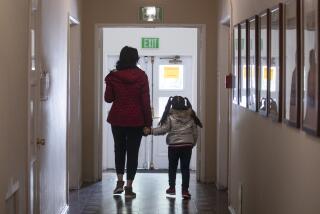When the safety net unravels
Dwight Smith, who runs the Catholic Worker homeless shelter in Santa Ana, couldn’t believe it last week when he saw that a homeless woman in a wheelchair had been dropped off on his front walkway.
“I hope you don’t think you’re staying here,” he said, pointing to the steps that must be climbed to get into the house.
Donna Tangeman, who had just $3 in her pocket, said her heart dropped. She said she had been steered to the Catholic Worker by a Garden Grove nonprofit agency dedicated to the disabled.
Knowing she had nowhere to turn, Smith paid for Tangeman, 54, and her female caregiver, who also is homeless, and their dog and cat to stay in a local motel for a week. He also brings them food, but doesn’t know how long the arrangement will last.
In the meantime, he said he was angry that a nonprofit agency would “dump” a handicapped person at a shelter ill-equipped to serve the disabled.
“To be completely abandoned seems so wrong,” Smith said. “We have this expectation that a woman this vulnerable will have a place to go. She doesn’t.”
Tangeman’s plight is an indication of how few resources are available to the Orange County homeless, particularly the disabled.
Several studies estimate the homeless population in Orange County at 7,000 to 11,000 people on a given night, but there are only about 3,000 beds in shelters available. One county count last year found 36 homeless people in wheelchairs over a year.
Debbie Groendal, operations manager at 2-1-1-Orange County, a county social services hotline, said most shelters are not equipped to help the disabled. “There are not many shelters able to take homeless people in a wheelchair,” she said. “It’s very difficult.”
Deby Harwell, program supervisor at Colette’s Children’s Home, a Huntington Beach sober-living facility, agreed.
Shelters “are hard enough to find for people who aren’t in a wheelchair,” she said. “It’s hard for the homeless to see where there are resources. They are in a desperate situation where it’s hard to
Mary Bishop, the homeless coordinator with the county, provided a list of emergency shelters that might help Tangeman, but most were either not open to the disabled or offered services for specific problems, like drug addiction.
The Salvation Army has a shelter, but Tangeman would have to leave each morning until it reopened in the afternoon, difficult when recuperating from surgery.
Even before her homeless stint, Tangeman’s housing situation was precarious. A longtime Orange County resident, she rented an apartment by the week. She gave it up when she had hip surgery, knowing she would live in a rehabilitation facility for several months. Then she planned to live with a friend, but the situation did not work out. After that, she said, she stayed at an Anaheim motel, where many of her possessions were stolen, and last week her money ran out.
She said she appealed to the Garden Grove-based Dayle McIntosh Center, which helps disabled people. She arrived at noon on Oct. 23, and at 3 p.m. she said she was told the center had found a place for her to stay.
The place was Isaiah House, run by the Orange County Catholic Worker community, an independent poverty relief group.
Dayle McIntosh Executive Director Bill Chrisener said he couldn’t discuss Tangeman’s case, but said “we have a difficult time finding shelters willing to take people with disabilities.”
“Sometimes we can’t do anything” to help those who need housing, McIntosh said. “We don’t always have the answers for people.” The center has already used up all its cash assistance for motel stays, he said.
Disabled people with pets are also hard to place, he said.
Tangeman wonders what she’ll do next. She has no money or family. Suffering from brittle bones, she has been in the wheelchair for more than three years. She also has asthma and an irregular heartbeat. She recently had both hips replaced, which she hopes will help her walk again.
Tangeman, who relies on $800 monthly in government assistance, plans to repay Smith someday.
“Once I can get on my feet, I know where I’ll be going,” she said. “I’m going to volunteer at the Catholic Worker, because they are the only ones who have helped me.”
More to Read
Sign up for Essential California
The most important California stories and recommendations in your inbox every morning.
You may occasionally receive promotional content from the Los Angeles Times.










